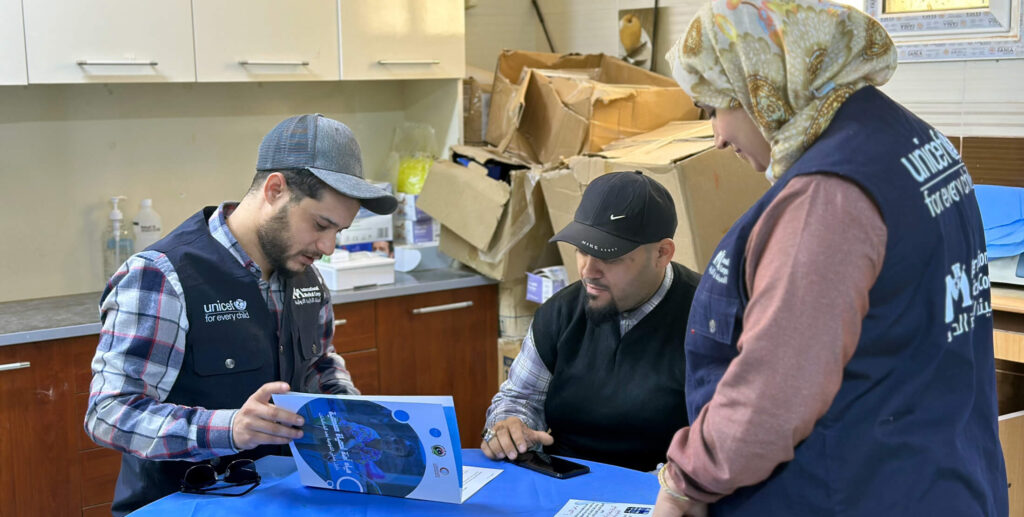In the early hours of September 11, 2023, Tayseer El-Haj and Dr. Rowayda Kalfah were working as emergency first responders, helping people affected by Storm Daniel, which had brought sudden heavy rainfall, flooding and devastation to northeastern Libya the day before. Tayseer was volunteering for the Libya Red Crescent at one location in the coastal city of Derna, while Rowayda, a surgeon, was working on behalf of the same organization at a shelter for internally displaced people.
“That was before the catastrophe took half the city,” Tayseer says.
The “catastrophe” was the collapse of two of Derna’s dams, which released 30 million cubic meters of water into the city of 90,000. The sudden burst of water swept entire buildings into the Mediterranean Sea, with thousands of people still inside of them. As many as 20,000 people were killed, while tens of thousands were injured or displaced.


The water rose to the third floor of the building where Tayseer was volunteering alongside Rowayda’s husband. Everyone in the building evacuated to the roof to keep from drowning.
“For me, it was something like a nightmare,” Tayseer says. “I just wanted to wake up and find that it wasn’t happening. There were bodies everywhere. People were out of their houses with no clothing or shoes. It was terrible, something that I think nobody can imagine.”
Meanwhile, Rowayda, working in a different part of the city, received devastating news from her colleagues. She was told that the Red Crescent centre, where she thought her husband was volunteering, had been destroyed and that he and many of the couple’s friends had been killed in the catastrophe. Though her husband and the other Red Crescent volunteers had been moved to a different location earlier that night, Rowayda didn’t know that. Yet despite her immense grief, she continued treating patients.
When asked how she managed to do this, Rowayda doesn’t have an answer.
“It might have been some kind of peace I got from God that made me focus on what I needed to do,” she says. “In the heat of the moment, I kept doing what was needed to save lives.”
Across town, Tayseer was experiencing similar fears and emotions.
“My family was safe, but I didn’t know,” he says. “I was imagining that the house was gone and my family was dead because I saw a lot of bodies and a lot of injured people. I was in shock, and the shock lasted for maybe five days.”
Everyone in Tayseer’s family was okay, but the flooding had created a nearly insurmountable barrier between him and his home. Though he was volunteering only five kilometres (three miles) from his house, Tayseer was forced to take a 100-kilometre (62-mile) detour to reach his family once he left work.
Months later, both Tayseer and Rowayda were still disturbed by what they’d experienced that day.
“I thought before that my work as a surgeon was difficult—I’d seen a lot of terrible things. But what I used to think was difficult as a surgeon doesn’t compare to anything I saw with the collapse of the two dams,” Rowayda remembers. “I won’t forget the pain that I felt that day. But I want to move forward to give support to other people.”
At International Medical Corps, Rowayda and Tayseer found a way to do exactly that.
From Health to WASH
In the days after the catastrophe, Rowayda noticed that the city’s water, sanitation and hygiene (WASH) needs were far more critical than its health needs. Indeed, 400,000 people were now without safe drinking water, while 250,000 lacked safe sanitation. Rowayda, who had previous WASH experience, joined International Medical Corps as a Hygiene Promoter, while Tayseer, who also had also worked in WASH, became a WASH officer.
Derna’s residents primarily rely on well water, and most of the area’s wells had either collapsed or been polluted by floodwaters. So both Tayseer and Rowayda focus on raising awareness about safe water access—how to identify contaminated water and purify it for drinking—especially for people who live far from the flooded area and who wrongly believe that their wells are safe. Tayseer and Rowayda have travelled across the city, explaining to people that all well water must be tested before drinking, and providing residents with jerry cans and water purification tablets.
“We are happy about the awareness raising, that the community now knows whether their water is safe and how they can purify the water to make it safe to drink,” Tayseer says.



Tayseer and Rowayda are part of a larger WASH team that has delivered 7.5 million litres of clean water to more than 15,000 people in flood-affected communities in and around Derna. The team has installed three 5,000-liter tanks in Derna’s health facilities and 32 smaller water tanks in homes impacted by flooding. Team members distribute hygiene kits and have provided more than 750 hygiene awareness sessions in schools, health facilities and on the streets of Derna on handwashing and water treatment.
The team has also started rehabilitating WASH infrastructure in eight health facilities in and around Derna, building additional space, adding ramps and other modifications for people with special needs, and installing bathrooms, water pumps and tanks.
As for Tayseer and Rowayda, they will continue working with our WASH team as long as the need exists.
“I will provide my assistance depending on my city’s needs,” Rowayda says. “As long as it needs WASH services and awareness raising, I’ll keep doing that until it’s not necessary anymore. Then I’ll find another way to help.”
